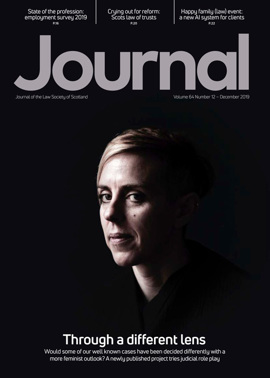Immunity overturned

Hester v MacDonald RIP
When I was a young idealistic recruit to the Procurator Fiscal Service in the 1970s I soon was entrusted with precognition work and then some jury trials to conduct.
It was at times overwhelming, but some more senior colleagues used to whisper, by way of encouragement, “Don’t worry son, if you make an arse of it, remember the Lord Advocate is immune from suit!” I found this hard to believe, and although reassured after reading Hester v MacDonald 1961 SC 370, I didn’t think it was terribly fair compared to the statutory limitation under which fiscals worked (now s 170 of the Criminal Procedure (Scotland) Act 1995), which limited liability unless malice or lack of probable cause could be proved.
A full bench decision in Whitehouse v Lord Advocate [2019] CSIH 52 (30 October 2019) has overturned Hester. Reference back to Hume made it clear that cases taken up by the Lord Advocate on behalf of a complainer could result in liability by the complainer if the information on which unsuccessful proceedings had been based indicated “malice on his part”. This gave rise to the contention that the Lord Advocate was immune from suit but was the basis for the Appeal Court indicating liability would exist if malice was established.
The pursuers had been prepared to argue that absolute immunity was out of date standing ECHR and, for example, a more modern approach in the Proceeds of Crime Act 2002, where if assets are frozen, the person affected has a right to seek compensation under s 283, if exonerated. This argument was unnecessary in the court’s view and proof before answer has been allowed. It will be interesting to see how this case pans out.
Sexual history applications
It has been a busy time in the High Court since the last briefing. Much of its output is governed by the vast number of sexual offences which make up its caseload. One aspect topical at the moment, amid the slew of Moorov-type cases is judicial concern about the number, relevance and timeliness of applications under s 275 of the 1995 Act. This and related sections exclude questioning complainers about their past sexual histories except in prescribed situations, typically when the allegations arise from what had been an ongoing consensual sexual relationship.
In HM Advocate v JG [2019] HCJ 71 (16 September 2019), Lord Turnbull took to task both parties for delay and lack of understanding of the s 275 process. The accused was charged with raping his ex-partner on various occasions and had been granted bail at petition stage. The accused and complainer had been in a relationship in 2016 and bought a house and moved in together. Towards the end of the relationship the complainer became pregnant, and had their child in May 2017. Police received a complaint about the accused’s conduct towards the complainer at the end of 2016, but she caused their enquiries to be discontinued. She made a complaint in September 2017 following a dispute about access to the child. The accused appeared on petition in March 2018.
At a preliminary hearing in February 2019 the court was informed enquiries were ongoing which might result in a s 275 application. Trial was set for June 2019 and a continued preliminary hearing took place in May, but no application was lodged until 6 June. As the Crown required time to consider the application, trial was adjourned until 19 September; the application was heard on 5 September.
Section 275B requires such applications to be lodged seven days before the preliminary hearing except on special cause shown. The application in this case had been lodged seven months after service of the indictment, more than six months after the preliminary hearing and two weeks before the second trial diet.
The defence solicitor said that in May 2018 the accused had disclosed that the allegations against him were linked to the presence of sado-masochistic images of the complainer being available online. It was suggested the images showed her with a former partner and enquires were undertaken to identify him. The defence had sought help from the Crown, which did not wish to become involved as it did not consider the material undermined its case. The defence traced him; he refused to provide a precognition but was cited as a witness. The court refused an application by the defence to adjourn the continued preliminary hearing; but at the June trial diet the Crown indicated it needed time to consider matters. On 3 September a police statement was taken from the ex-partner which was disclosed to the defence. It was suggested that when images of the complainer became available online, she fabricated allegations of rape by the accused.
The court noted the discretion it has to reject s 275 applications made late – many such applications are rejected by the court on that basis alone. It was also critical of the length of the application (10 paragraphs) and how certain matters averred were irrelevant and unconnected with the images the defence wished to produce.
The constituent parts of a s 275 application are set out in subs (3); it needs to specify, first, the evidence sought to be admitted and the nature of any proposed questioning. What the application lacked in relation to s 275(3), however, were details of the issues at trial to which the evidence was considered relevant, the reasons why that evidence was considered relevant to those issues and the inferences which should be drawn therefrom. Most of the items raised in the application were refused due to lack of reason, lack of a defence of consent being lodged or being unnecessary since they concerned acts arising during the relationship between parties. In the event one sentence of the application was allowed, as it concerned an assertion that parties had consensual sex during the period of the libel.
It is clear from this and other cases that a firm line is being taken in relation to s 275 applications, and care should be taken not to include irrelevant material or evidence which would be inadmissible at common law.
(Postscript: I made enquiries with the Justiciary Office about the outcome of the case and why it had been anonymised.
The accused was acquitted after trial on 27 September 2019.)
Evidence for conviction?
A s 275 application also featured in SG v HM Advocate [2019] HCJAC 68 (24 October 2019). An application had been made and dealt with at the preliminary hearing.
During cross-examination of the complainer the trial judge asked if there had been a s 275 application as he did not have a copy with his papers. The court said the judge should always have a copy to hand at the start of the trial. Indeed although a s 275 application might be granted at an earlier hearing, the trial judge may in the light of evidence refuse to allow a line of questioning if it becomes clear it is unnecessary to question the complainer on what now appears an irrelevant aspect of her sexual history (see s 275(9)). The matter may be considered afresh at trial under s 275B on special cause being shown).
SG mainly concerns an appeal on the ground that no reasonable jury would have convicted of rape. The appellant did not give evidence or advance a defence of consent. There was a defence of alibi but no evidence was led in support. Evidence from the complainer that she had been abducted by the accused did not form part of the charges, and reliance was placed on telephone contact between parties around the time of the incident, and grainy CCTV. There was also photographic evidence of injuries to the complainer and copious bloodstaining at the locus.
While there have been a number of appeals on this ground recently, the test is a high one, namely that no reasonable jury properly directed could have returned a guilty verdict. The defence suggested an inference could be drawn that the complainer had invited the appellant to her home; however no defence of consent had been advanced and there was ample evidence that a rape had occurred, albeit abduction was in doubt (and was not charged). The appeal against the rape conviction was refused.
Briggs v HM Advocate [2019] HCJAC 63 (26 June 2019) involved rapes against two family members. The appeal centred on whether there was a sufficiency of evidence, it being advanced that the complainer did not say she was not consenting and did not give evidence that the appellant would have known that. The trial judge’s report listed 15 points pointing to a sufficiency. The Appeal Court said the complainer’s evidence had to be taken as a whole, and showed a clear pattern of avoiding the appellant. The appellant’s position was that the incident did not occur, therefore the Crown did not have to prove a lack of honest belief.
Sentencing: special needs
In RC v HM Advocate [2019] HCJAC 62 (2 October 2019) a sentence of 21 months’ imprisonment, in respect of offences involving internet grooming of young girls and persuading them to remove their clothing, was quashed. Ordinarily, this type of behaviour would attract a prison sentence, but the appellant was born with spina bifida, was doubly incontinent and needed the help of his mother and aunt for toileting, dressing, eating, washing and mobility. He was a wheelchair user, wore incontinence pads which had to be changed frequently, requiring the use of a large table in a disabled toilet, and also had diabetes and ulcers on his legs which required constant treatment.
The sheriff sought additional information about the care needs the appellant would require if imprisoned, to which the prison indicated they “did not believe they had the capacity to provide for all of the appellant’s needs safely”.
Prison staff had difficulty accommodating the appellant and had to separate him from other inmates for his safety. They had to call on relatives to help with his care. While facilities put in place by the prison authorities were such that article 3 ECHR regarding undue suffering was not engaged, he was a first offender, assessed as a medium risk and thought amenable to treatment, in particular under the Moving Forward, Making Changes programme. The court quashed the prison sentence and imposed a three year community payback order with supervision, programme and conduct requirements.
Personal bar against Crown
In HM Advocate v Gilmour [2019] HCJAC 74 (22 January 2019) the appellant had pled guilty to severe injury in an assault in 2012 and was sentenced to five years four months’ imprisonment, as the crime occasioned an intracranial bleed from which long term disability was anticipated. The victim died of his injuries in April 2017. Proceedings for murder were raised under s 11 of the Double Jeopardy (Scotland) Act 2011. Challenge was taken that having accepted a reduced plea of assault to severe injury, the Crown was precluded from charging murder and indeed the Lord Advocate was personally barred from so doing.
The court rejected the argument and considered the statute was clear that murder could be charged in light of the changed circumstances. No indication had been given by the Crown that it had relinquished the right to prosecute, therefore the Lord Advocate could not be personally barred from indicting on a charge of murder.
Bail on extension of 140 day period
In Abid and Hayat v HM Advocate [2019] HCJAC 73 (4 September 2018) the Appeal Court ruled that the accused, charged with (and ultimately convicted of) murder, had been entitled to seek bail, when after they were remanded on petition from the outset, the Crown sought an extension of the 140 day period. In the event no change of circumstances was shown under s 30(2) of the 1995 Act and the decision to grant bail was overturned.
No objection to the motion to extend the time bar had been taken and the court noted this would have been an opportunity to have the accused’s interests considered, as both were female with three and five children respectively. The Crown said the charges were very serious and included an attempt to defeat the ends of justice; there were concerns that the children who were due to give evidence might be influenced and regarding the unsettled immigration status of the first accused.
The court noted however that there had been no objection to the motion to the extension, whereas under s 72A of the Act the interests of the accused would be considered as part of the decision making process.







